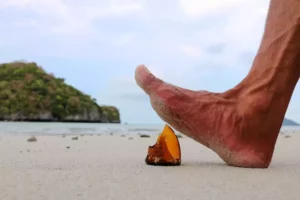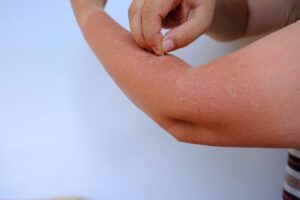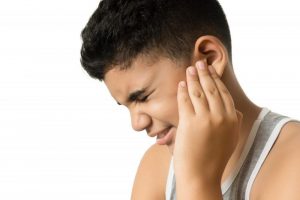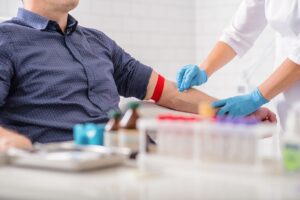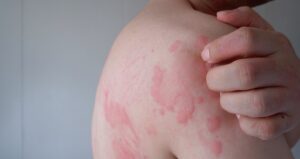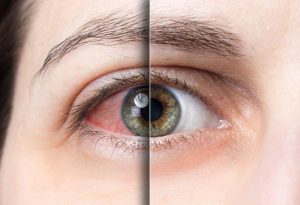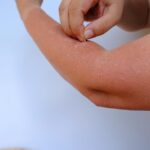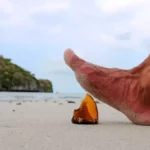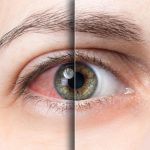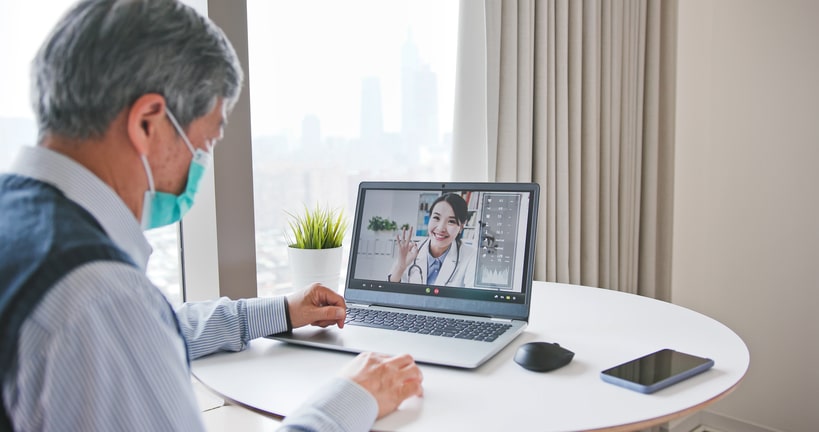When summer is around the corner, you might be planning for some sun-soaked adventures with your friends and family. But let’s face it: in the quest to enjoy summer delights, we might fall into the trap of mild to severe sunburns, including sun poisoning.
Fear not, as clarity awaits! In this blog, we have an ultimate guide ready for you to battle the sun poisoning symptoms. Not to mention, we’ll reveal the thin line difference between sunburn and sun poisoning. From decoding the unmistakable signs of sun sickness to taking the precautions to prevent it, we’ve got your back.
So, grab a comfy spot in the shade and be ready to dive into the sunny side of self-care to manage sun poisoning.
What is Sun Poisoning?
Sun poisoning is a misleading term, as most people perceive it as getting poisoned due to sun exposure. But does sun poisoning really occur?
No! In simple words, sun poisoning or sun sickness is a severe form of sunburn that presents as an allergic reaction due to prolonged exposure to sunlight. The symptoms start out with sunburn symptoms like redness and mild pain. But after prolonged exposure, they can lead to complications like blisters, fever, dehydration, nausea, and dizziness.
Some Common Signs and Symptoms Of Sun Poisoning?
Identifying sun sickness symptoms may seem elusive at times, but recognizing your body’s immediate signals can be a key to timely intervention.
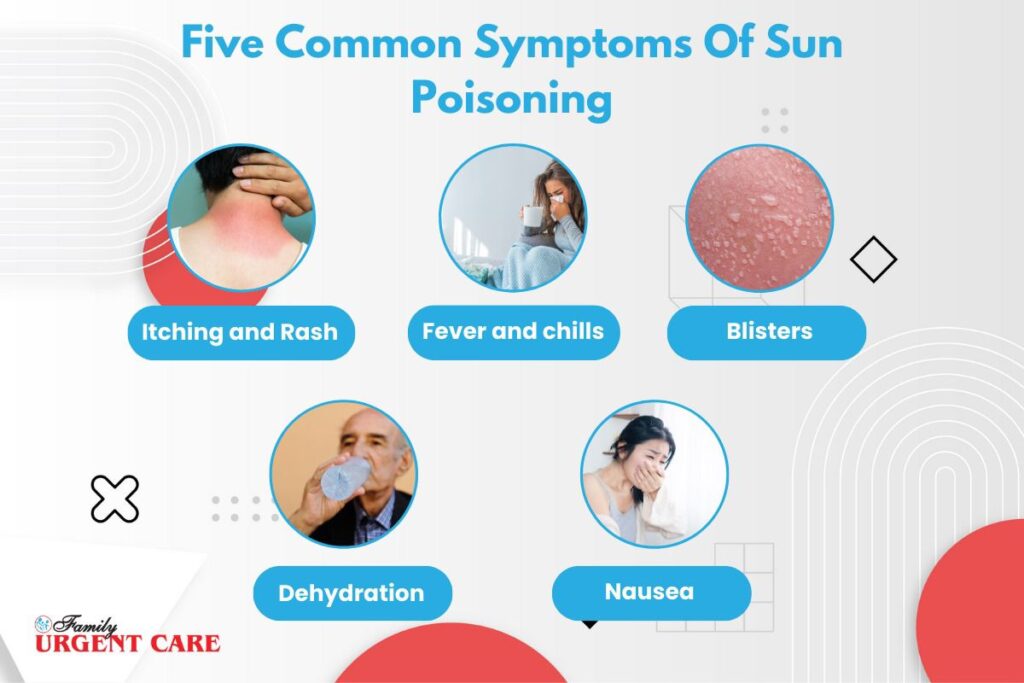
Here are a few symptoms to know if you have sun poisoning or not.
Intense Redness, Swelling and Pain: Sun poisoning often starts with sunburn symptoms like widespread redness and mild swelling. The affected area might feel painful.
Itching and Rash: Sun Poisoning commonly causes itchiness and rashes on the sun-exposed areas, usually legs, hands, face, chest, and feet.
Blisters or Bumps: Due to the excessive UV rays, blisters can form on the skin. This is because of the inflammatory response as the body attempts to repair and heal the damaged skin.
Flu-like symptoms: In some cases, you might also experience flu-like symptoms like fever, chills, headaches, and body aches.
Dehydration: Due to longer exposure to sunrays, a person’s fluid needs increase, exacerbating dehydration.
Nausea and Dizziness: These symptoms can occur due to various reasons like dehydration, pain and stress.
How Do You Differentiate Sunburn and Sun Poisoning?
Since both the terms seem similar, most people often use them interchangeably, adding a layer of confusion. Nevertheless, there is a thin line between sunburn and sun poisoning that differentiates the two. In simple words, sun poisoning is a severe form of sunburn.
| Sunburn | Sun Poisoning |
| It primarily affects the skin, involving redness, warmth, and mild pain in sun-exposed areas. | It includes all the symptoms of sunburn but presents with more severe symptoms, such as blistering, skin peeling, fever, nausea, and dizziness. |
| Sunburn can lead to mild dehydration. | Sun poisoning carries a higher risk of dehydration due to severe sunburn |
| Sunburn only damages the outer layers of the skin, causing redness and irritation. | It can cause deeper skin damage with more pronounced inflammation, leading to blistering or bumps. |
| Sunburn can resolve within a few days after taking some cooling measures and applying moisturizers and pain relievers. | Sun poisoning needs more comprehensive care, including addressing dehydration and taking timely intervention. |
Most Common Forms of Sun Poisoning That You Should Know
Different forms of sun poisoning exhibit specific symptoms. One of the most common forms is Polymorphous light eruption, which is a common itchy rash that appears within hours or days after exposure to intense sunlight.
It heals without scarring your skin and lasts for up to two weeks, depending upon the care and sunlight exposure within those days.
Polymorphous light eruption commonly occurs in individuals who are not used to high-intensity sunlight, such as people living at high altitudes where winter seasons exist more.
The most severe form of sun sickness is solar urticaria, which occurs due to the release of histamine and other chemicals under the skin. Any UV light can trigger solar urticaria.
The most common symptoms of solar urticaria include hives and itching with a burning sensation, which occurs within minutes of solar exposure. In exceptional cases, it can also cause breathing difficulties, nausea, vomiting, and changes in heart rate.
Six Common Causes of Sun Poisoning
If you know the triggers of sun poisoning, you can totally dodge it like a pro! It’s like having a secret recipe to keep those severe sunburn symptoms at bay.
Let’s explore some causes of sun sickness to gain a better idea of the factors at play.
- Prolonged Periods Of Sun Exposure: Spending a long time during peak hours of intense sunlight can increase your risk of sun poisoning.
- Not Using Sunscreen: Neglecting sunscreen is a common cause because many people need to pay more attention to its crucial importance in protecting your skin. A sunscreen with a low sun protection factor (SPF) can also be a factor of less protection from harmful UV rays.
- Type of Skin: People who have fair skin are more susceptible to sun poisoning as this skin type has lower melanin levels, increasing the risk of sun sickness or sunburn.
- Certain Medicines: Some common medicines, such as antibiotics, diuretics, and NSAIDs, can increase sensitivity to UV rays. If you’re at a higher risk of sun poisoning, chat with your doctor about the precautions you should be taking to protect yourself from sunburn while taking your ongoing medicines.
- Outdoor Activities: If you’re engaging in outdoor activities like hiking expeditions, traveling, or outdoor sports for prolonged periods, it can heighten the risk of sun poisoning.
- Pre-Existing Condition: People who suffer from eczema or lupus are more likely to get sunburn or sun poisoning, so they need to take extra care when going out.
How Long Does Sun Poisoning Last?
Mild sunburns with redness and pain typically last for two days, depending upon your physiological body response. However, severe sunburns in the form of sun poisoning will last longer for up to two weeks, depending upon your recovery.
The duration of sun sickness depends on a few factors, like
- the type of skin you have,
- Whether you had sun exposure within peak hours
- High altitudes
- If you have any pre-existing condition or are taking any medications.
To ensure a faster recovery, you can visit a nearby doctor or an urgent care clinic to treat the painful blisters, severe redness, or itch.
What Can You Do to Get A Relief from Sun Poisoning Symptoms At Home?
Let’s explore some simple yet effective ways to alleviate the burning symptoms of sun sickness from the comfort of your home.
- Cool compress the area where you feel redness, itch, or burning sensation to reduce swelling and inflammation.
- Moisturize your skin with a moisturizer along with natural ingredients like aloe vera or chamomile.
- Increase drinking plenty of fluids or water to prevent dehydration.
- Apply sunscreen with a high sun protection factor (SPF) over sun-exposed areas like the face, neck, or ears.
- If you have mild pain in any area of the skin, you can also take some over-the-counter medications like ibuprofen or acetaminophen.
Just a quick heads up! While some cases of sunburn can be treated at home, it is equally essential to understand that severe cases of sun sickness require treatment from a medical expert. Therefore, consult your doctor immediately if you’re unsure about the severity of your symptoms.
Reminder: If you have severe pain or swelling, blisters, high fever and chills, nausea, vomiting, or headache, seek medical attention immediately, as these are the signs of severe sun poisoning.
How Can You Prevent Sun Poisoning If You Have A Higher Risk?
Let’s spill some beans on how to outsmart the sun and keep your skin relaxed in summer.
- Reduce Sun Exposure: Avoid outdoor activities for a few days for extra protection from sun rays. You can also wear a proper hat or stay in the shade where possible.
- Contact Your Doctor If You’re Taking Medications: Your doctor can tell you whether your current medications can increase the sensitivity to sunlight or not. Stay vigilant on which medications can increase your risk of severe sunburn.
- Avoid Tanning Beds: Tanning beds emit concentrated UV rays that make people more susceptible to sunburn. Therefore, most medical experts advise to avoid using tanning beds.
- Apply Sunscreen Daily: Apply sunscreen with a reasonable SPF 30 minutes before leaving your home. You can reapply if you sweat or wash your face and hands with water.
By taking these safety measures, you can minimize the risk of sun hangover sickness or sun poisoning symptoms in no time.
How Does Family Urgent Care Help You Treat Skin-Related Conditions?
Whether you have a sun poisoning rash, mild sunburn, or an unexpected skin-related issue, Family Urgent Care is your go-to partner for effective treatment.
We specialize in offering prompt and personalized care through our experienced medical experts, who are well-equipped to address a range of skin conditions and provide the relief you need.
You can visit our Family Urgent Care clinic in Schererville, Lincoln Park, or Rogers Park seven days a week and get treated without an appointment.
References
Polymorphic light eruption. (2017, October 24). Nhs.uk. https://www.nhs.uk/conditions/polymorphic-light-eruption/
British Association of Dermatologists. (2023). Bad.org.uk. https://www.bad.org.uk/pils/solar-urticaria/



